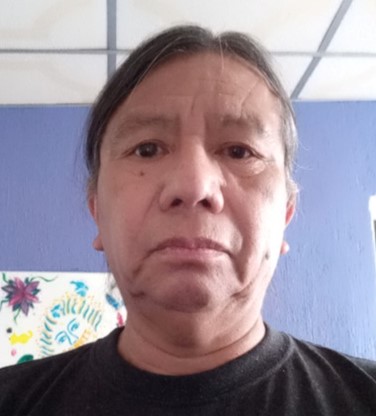Resources
The following tailored resources and guides provide practitioners, academics and activists with concrete strategies and tools to support the development of digital archives while seeking truth, justice and accountability in periods after conflict.

Documentation and Archiving Challenges

Human Rights Documentation by Civil Society – Technological Needs, Challenges, and Workflows
This report aims to assist civil society organizations in documenting human rights violations by ensuring they have access to sustainable, tailored, and secure technological solutions. This resource is available in English.
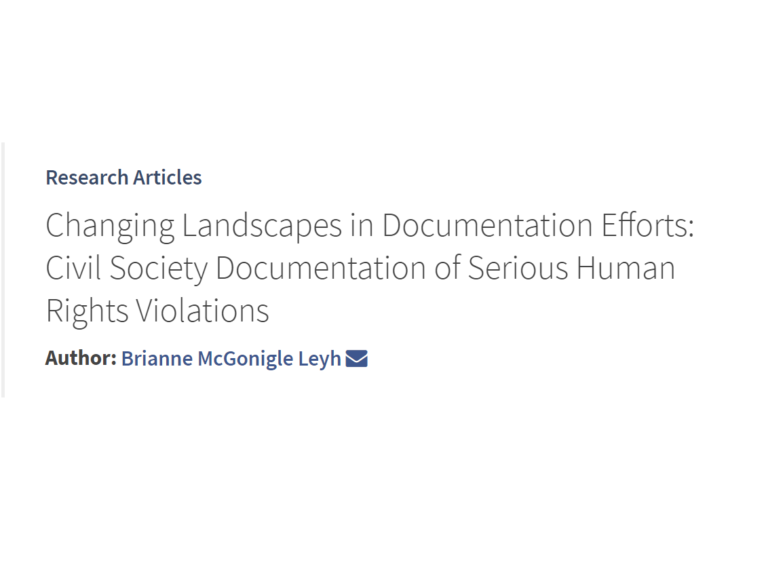
Changing Landscapes in Documentation Efforts: Civil Society Documentation of Serious Human Rights Violations
The purpose of this article is to explore the changing landscape of civil society documentation of serious human rights violations, and what that means for standardizing and professionalizing documentation efforts.
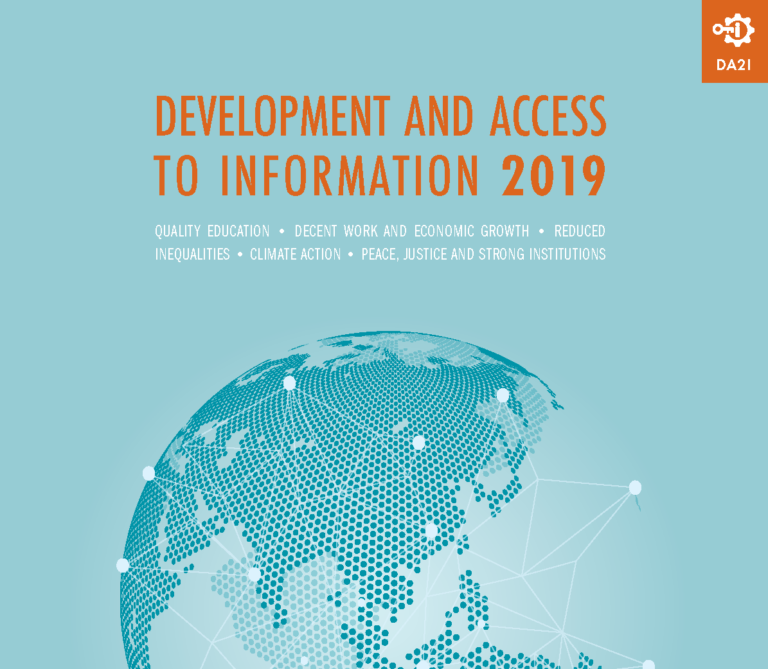
IFLA & TASCHA, 2019
The goal of this report is to provide an exploration of access to information as a driver of development. In doing so, it seeks to inform decision-making about the implementation of the UN's Sustainable Development Goals (SDGs). It is designed to be applicable at all levels about how best to build stronger, fairer, more sustainable societies. This report is also available in Portuguese. Please, see the resource below.
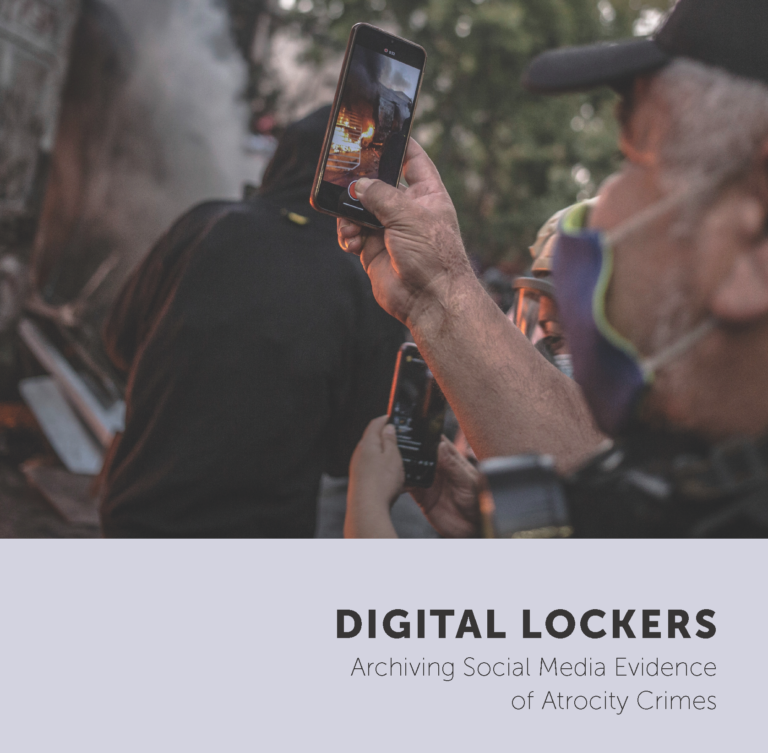
Digital Lockers: Archiving Social Media Evidence of Atrocity Crimes
This report provides an overview of various models that have previously been used to archive social media content and other digital information.
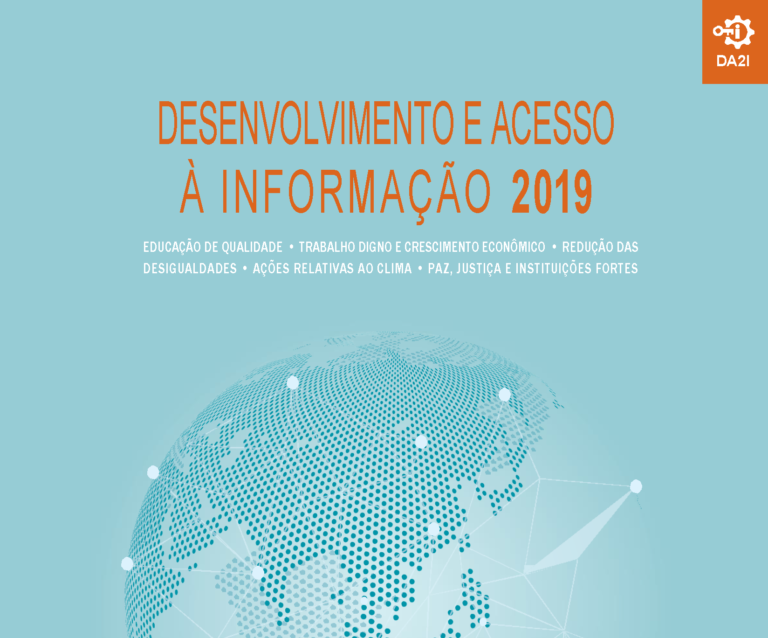
Desenvolvimento e Acesso á Informação
Este relatório fornece mais evidências, exemplos e análises dessa contribuição e do papel das bibliotecas na sua concretização. Ele está explicitamente focado na Agenda de 2030 das Nações Unidas e em seus Objetivos de Desenvolvimento Sustentável (ODS), que fornecem tanto uma afirmação da importância do acesso à informação para o desenvolvimento, quanto um marco para se pensar sobre como realizar seu potencial.
Documentation Guides from Civil Society
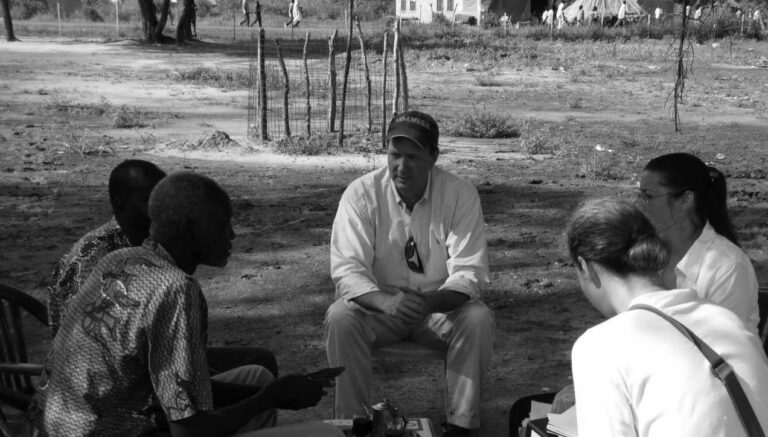
Handbook on Civil Society Documentation of Serious Human Rights Violations
The Human Rights Documentation Toolkit is a multi-sector and interactive online portal accessible to human rights documenters on the ground, providing them with existing documentation resources, best practices, and ongoing support from other documentation stakeholders.
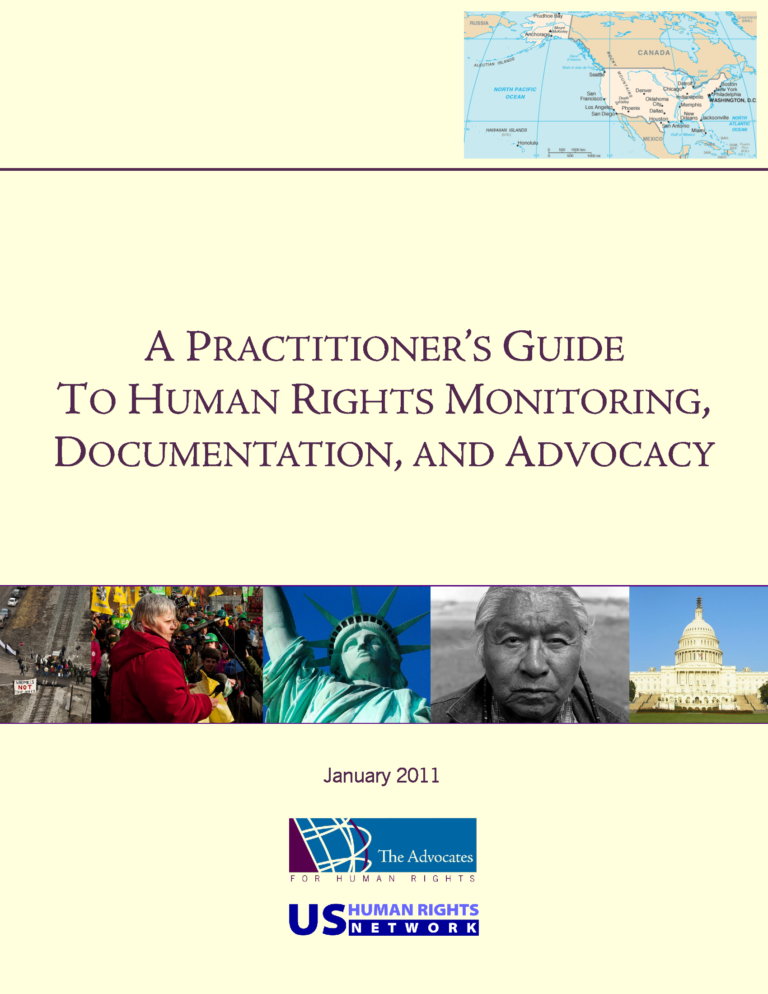
A Practitioner’s Guide to Human Rights Monitoring Documentation, and Advocacy
The purpose of this manual is to provide step-by-step guidance for advocates who want to use human rights monitoring, documentation, and advocacy in their social justice work. This resource is available in English.
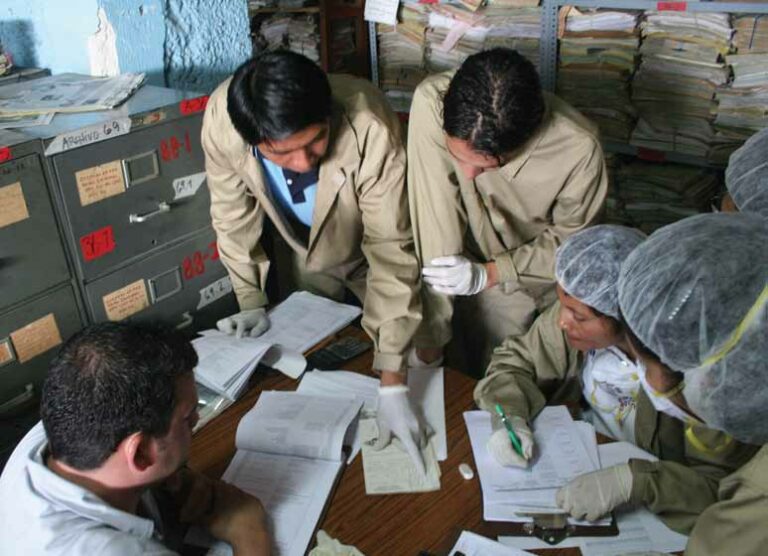
Documenting Truth
This report shares lessons learned from the Documentation Affinity Group (DAG), established in 2005 as a peer-to-peer network of local action organizations across the globe, with a primary focus on human rights documentation.
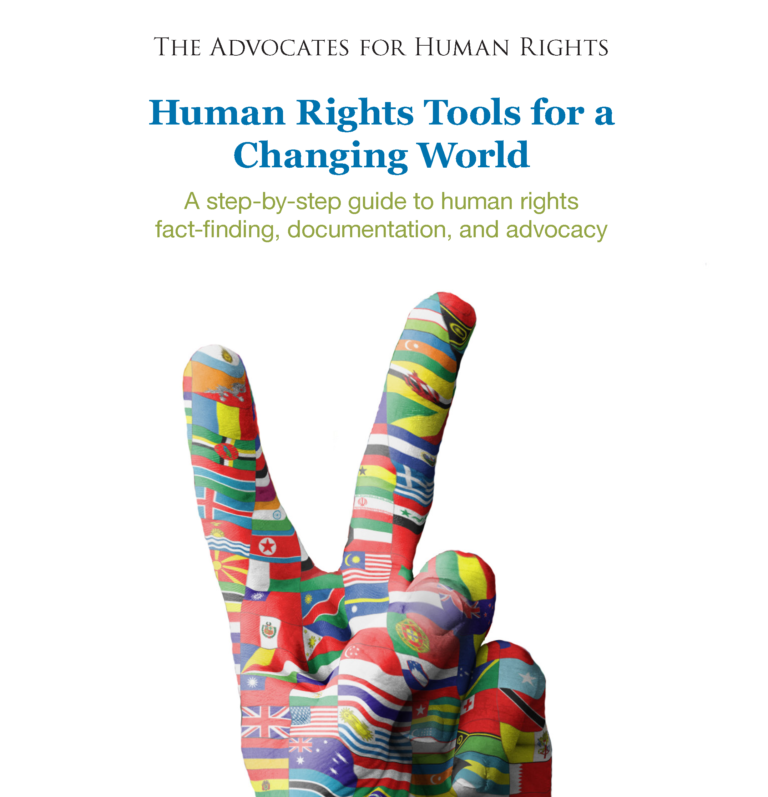
Human Rights Tools for a Changing World
This paper reviews some of the leading international criminal cases involving digital evidence, with a particular focus on the ICC, and identifies four types of evidentiary considerations specific to digital evidence: (1) authentication; (2) hearsay; (3) provenance (chain of custody); and (4) preservation of evidence.
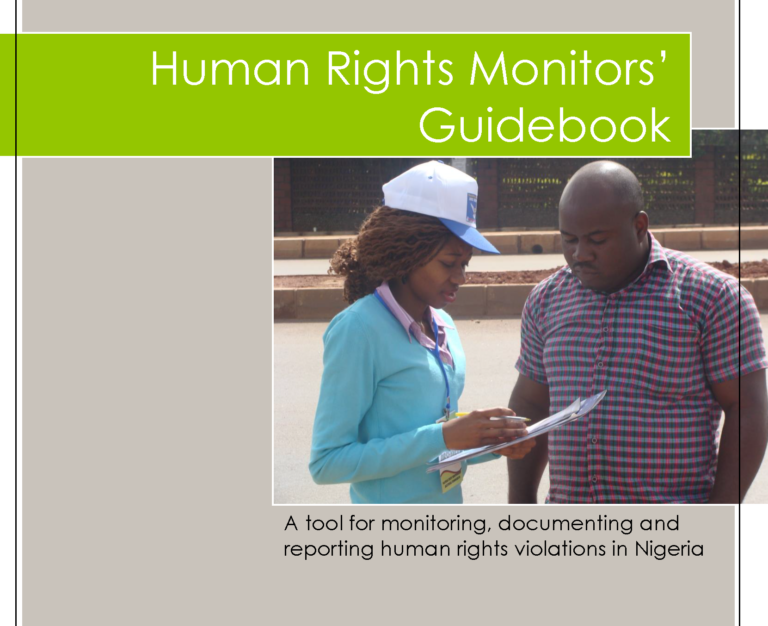
SEARCH FOR COMMON GROUND, 2014
A tool for monitoring, documenting and reporting human rights violations in Nigeria.
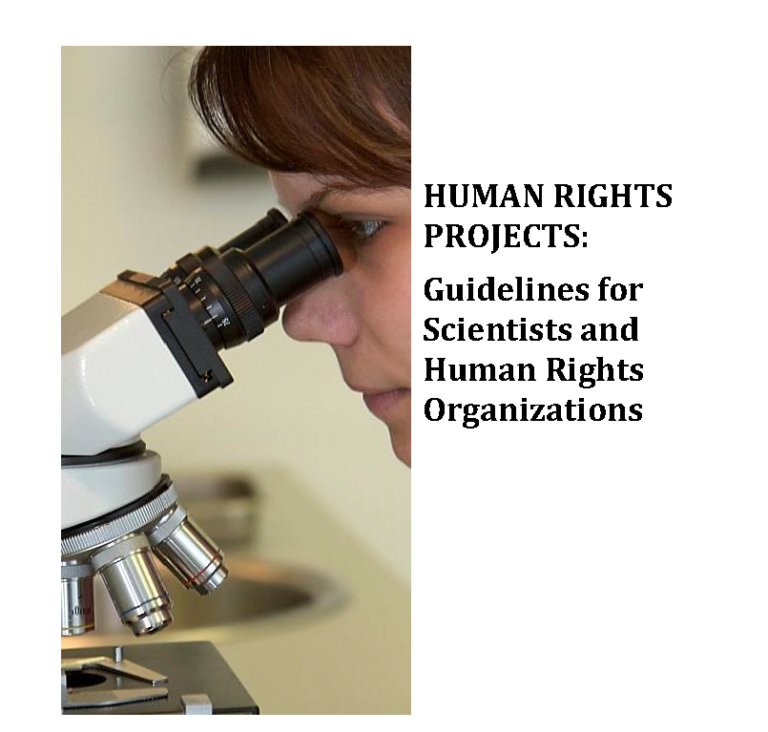
Human Rights Project: Guidelines for Scientists and Human Rights Organizations
These guidelines provide a framework for managing expectations and facilitating collaboration between scientists and human rights organizations
Documentation Methodology and Data Management
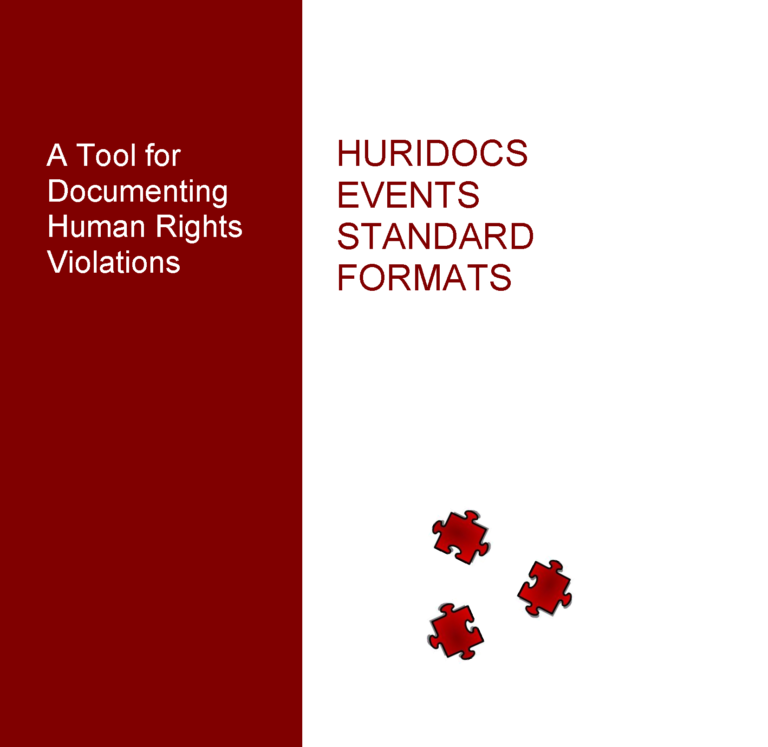
Events Standard Format
This is a tool for documenting human rights violations, describing Huridocs' methodology for using the "violations" approach to the monitoring and documentation of violations. This resource is available in English.
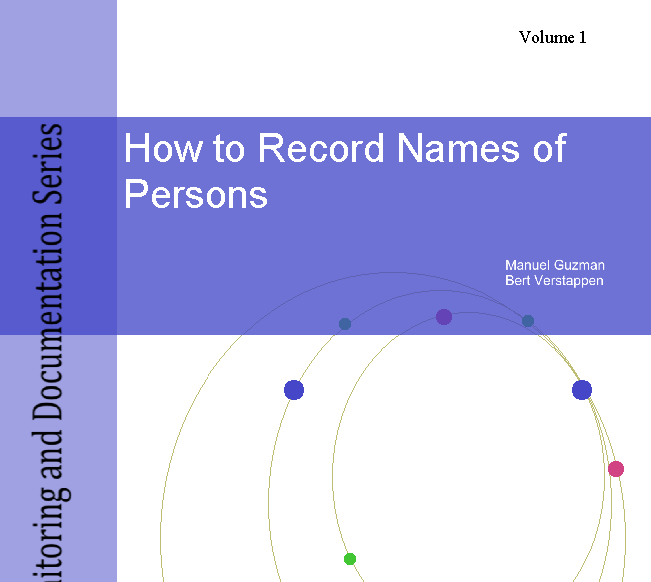
How to record the names of persons
These "Guidelines for Recording the Names of Persons" are intended to provide a set of standard rules for use when completing any of the HURIDOCS Standard Formats for the recording and exchange of information on human rights.
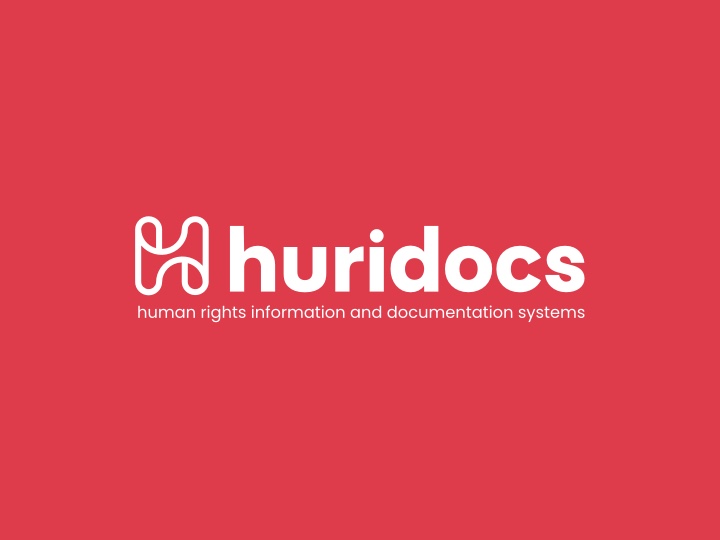
Controlled Vocabulary
As part of the pursuit of justice and accountability, human rights defenders need to create and manage often large collections of information. This includes documenting evidence of ongoing or past human rights violations, compiling libraries of human rights law, or monitoring a human rights situation for the purposes of reporting. This resource will support your work on finding methodologies, guides, frameworks for documentation purposes.
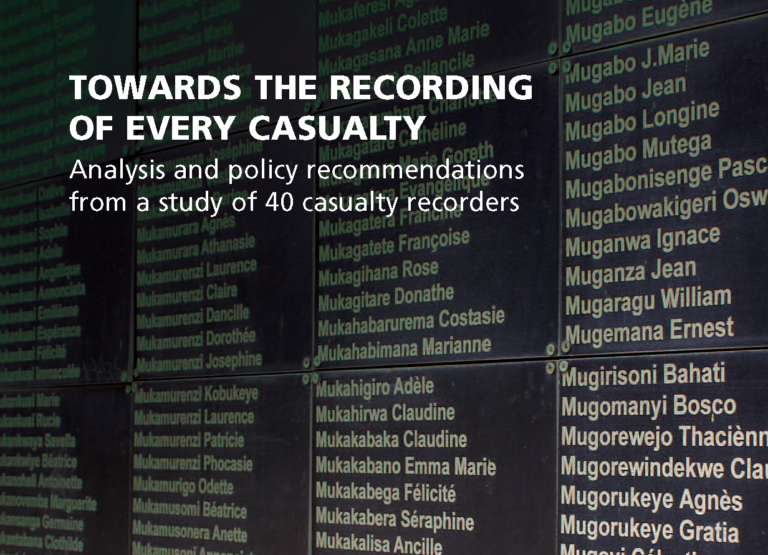
Towards the Recording of Every Casualty
This policy paper argues that comprehensive recording of the deaths of individuals from armed conflict can and should be done. The paper demonstrates this from the results of detailed research by Oxford Research Group (ORG) into the work of forty organizations and individuals who record the casualties of different conflicts across the globe.
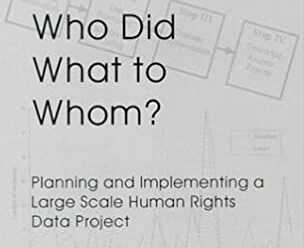
Who Did What to Whom?
This handbook focuses on supporting human rights organizations in telling the truth by using an information management system to maintain systematic control over the various pieces of human rights stories they receive.
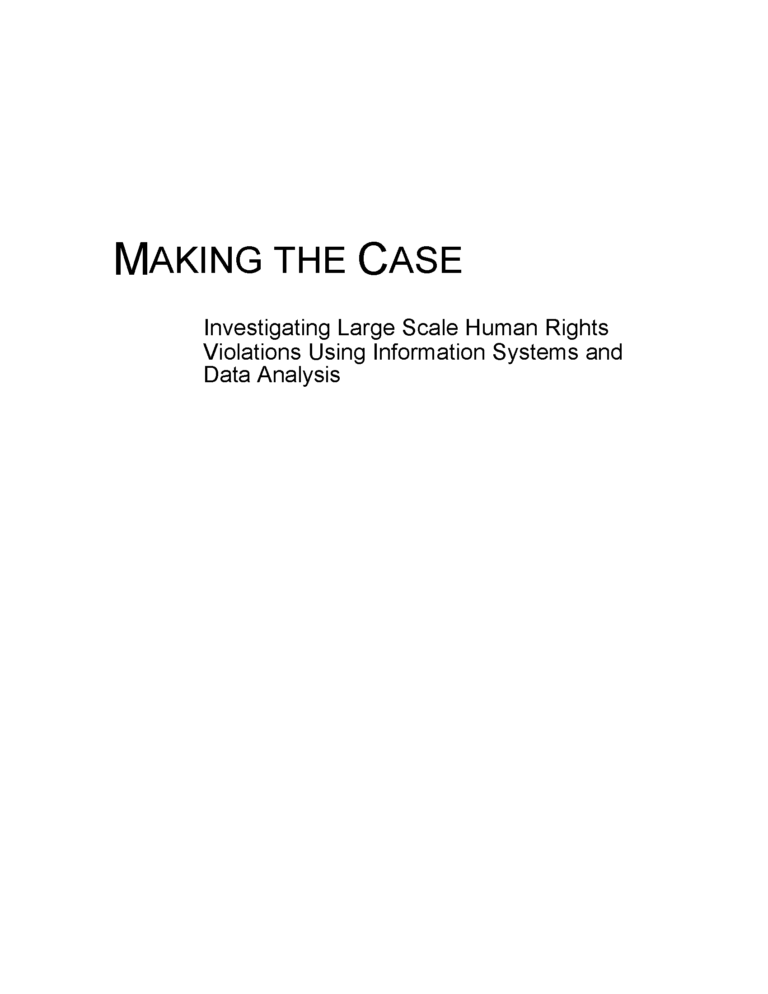
Making the Case
This collection of papers aims to share experience and lessons learned from investigating large scale human rights violations using information systems and data analysis.
Tech Tools

Tech Tools for Human Rights Documentation
This short report has been excerpted and adapted to focus solely on specific tools and their development in the human rights documentation space. This resource is available in English.

Technology Tools in Human Rights
This is a scoping study on how human rights defenders (HRDs) are using technology tools to communicate, analyse and manage information, identify new incidents and archive data. It aims to help understand the realities of tool use and identify HRDs’ needs as they stand.
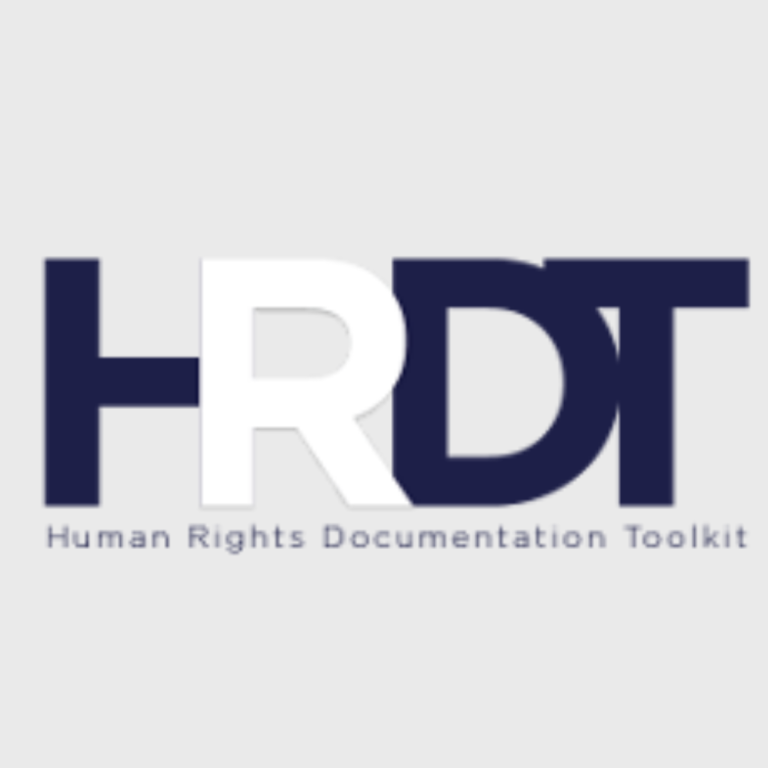
Human Rights Documentation Toolkit
The Human Rights Documentation Toolkit is a multidisciplinary, interactive online portal providing human rights documenters with existing documentation resources and tools, broadly accepted practices, and ongoing support from other documentation stakeholders.

Violations Database: SJAC’s Database Software
SJAC’s goal is to provide human rights documenters all over the world with open-source software that will allow them to safely and securely preserve and analyze evidence of human rights violations.

Uwazi Reveal
Uwazi is a flexible database application designed for human rights defenders to capture and organize collections of information. This web-based platform, developed by HURIDOCS, can be customized for a variety of needs. The code is available on GitHub.

AtoM installation
AtoM stands for Access to Memory. It is a web-based, open source application for standards-based archival description and access in a multilingual, multi-repository environment.
Digital Security
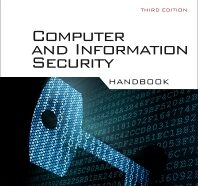
Computer and Information Security Handbook
This book offers deep coverage of an extremely wide range of issues in computer and cybersecurity theory, applications, and best practices, offering the latest insights into established and emerging technologies and advancements.
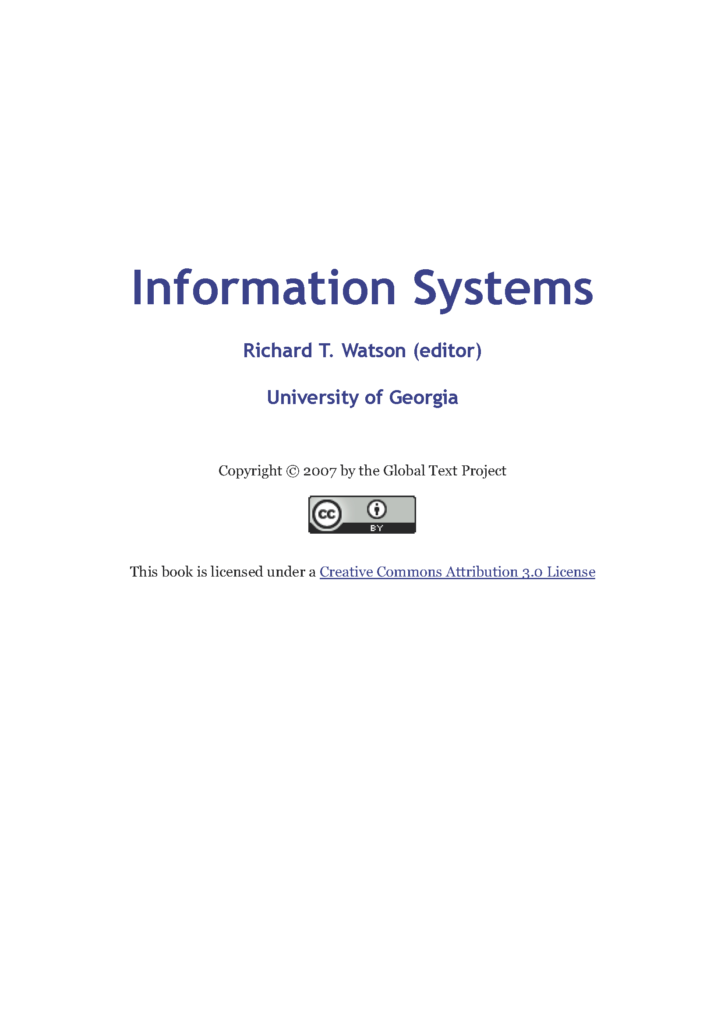
Information Systems
This electronic textbook illustrates the ways in which Information Systems (IS) is integrated into organizations, strategies to support knowledge workers, and the importance of IS to an organization’s success.
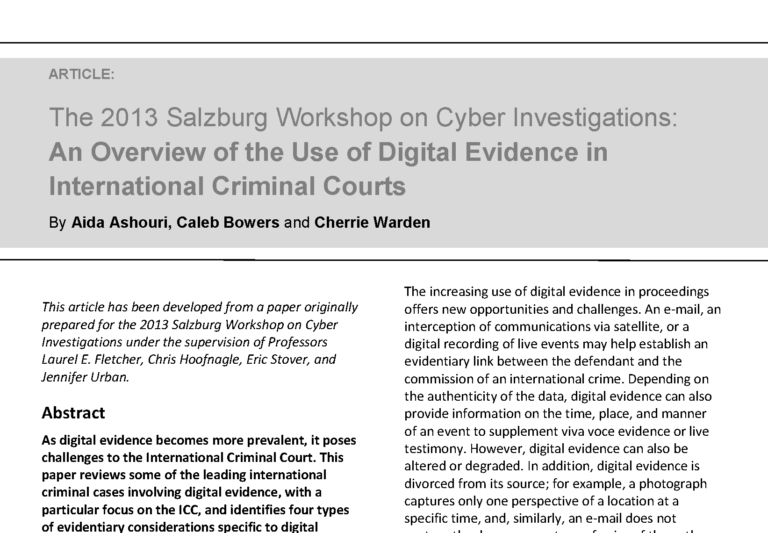
An Overview of the Use of Digital Evidence in International Criminal Courts
This paper reviews some of the leading international criminal cases involving digital evidence, with a particular focus on the ICC.
Directives and Protocols from International Organizations
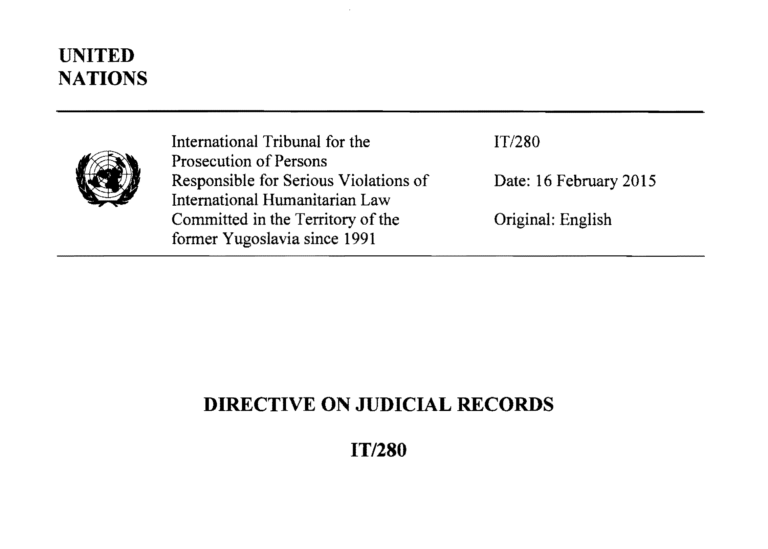
ICTY, Directive On Judicial Records
United Nations policies on record-keeping applied in the ICTY. This resource is also available in French. Please, see the following resource.
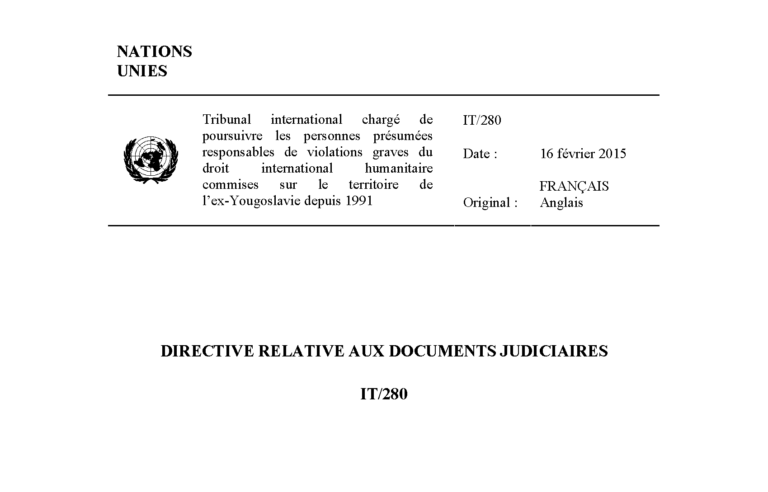
Directive Relative aux Documents Judiciares
Les politiques des Nations Unies en matière de tenue de dossiers sont appliquées au tribunal international.
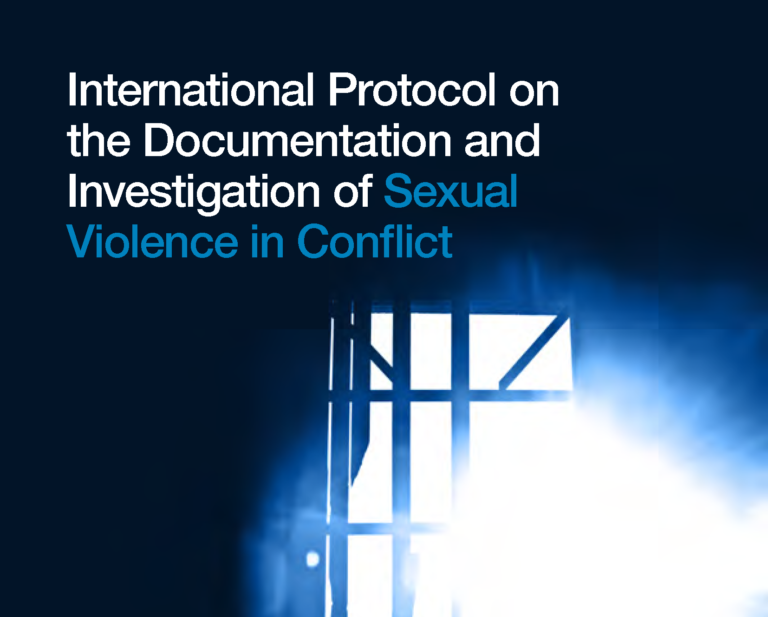
International Protocol on the Documentation and Investigation of Sexual Violence in Conflict
This International Protocol was introduced in June 2014 to help overcome the barriers to prosecution, by setting out clearly and comprehensively the basic principles of documenting sexual violence as a violation of international law. The International Protocol has so far been translated into 9 languages and used by lawyers, police, medical personnel and NGOs to gather evidence and investigate crimes to help strengthen prosecutions in at least a dozen countries in Europe, Africa, Asia, the Middle East and South America.
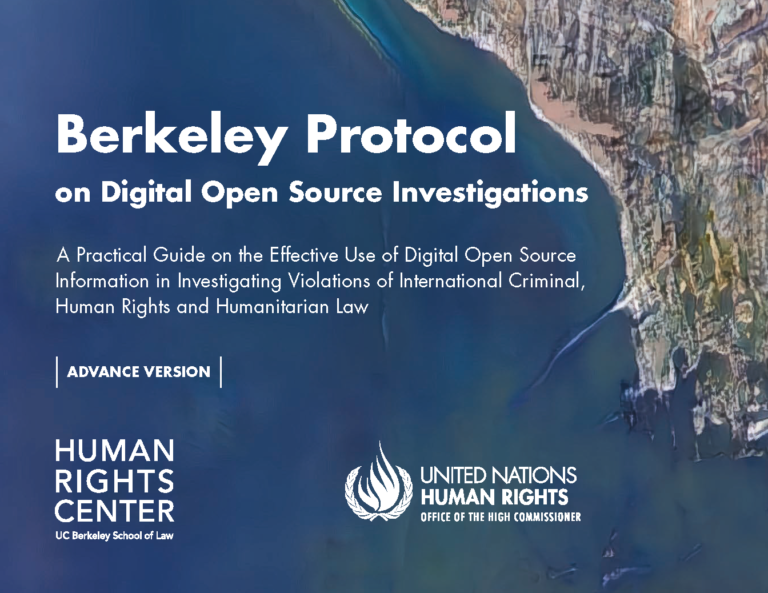
Berkeley Protocol on Digital Open Source Investigations
A Practical Guide on the Effective Use of Digital Open Source Information in Investigating Violations of International Criminal, Human Rights and Humanitarian Law
Digital Information Standards
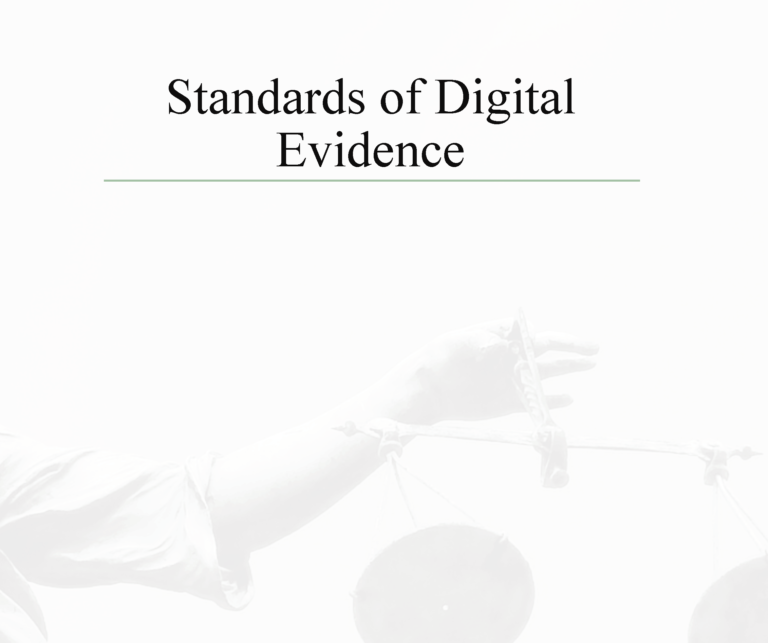
Standards of Digital Evidence
The following report aims to contribute to the dialogue on how best to respond to the challenges of digital evidence by outlining best practices when handling and collecting digital evidence. This report is available in English.
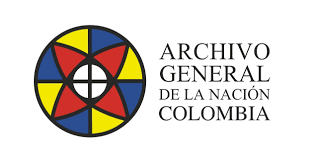
Compilación Normativa de Orden Nacional
El Archivo General de la Nación presenta este instrumento elaborado con el propósito de dar a conocer el desarrollo normativo en Colombia mediante la compilación de normas de orden nacional, en materia de Documento Electrónico, Firma Digital, Interoperabilidad y SGDEA, en un periodo de tiempo comprendido entre 1995 a 2013, permitiendo de esta manera establecer un referente normativo que contribuya a la ampliación del conocimiento y de elementos para fomentar una mejor aplicabilidad de la normatividad vigente.

Estándares de Gestión Documental
El Archivo General de la Nación en desarrollo de la Ley 594 de 2000, de la Ley 1712 de 2014 y del Decreto 2609 de 2012; presenta el siguiente documento que es el resultado de la identificación de normas técnicas internacionales y nacionales elaboradas en el marco del Sistema Nacional de Archivos.

Activist Guide to Archiving Video
Archiving video is an essential but often overlooked component of video advocacy. Learn about best practices for organizing, storing, preserving, and sharing your footage. Find this resource also available in Arabic, Portuguese and Spanish. For those languages, please see the next row of resources.
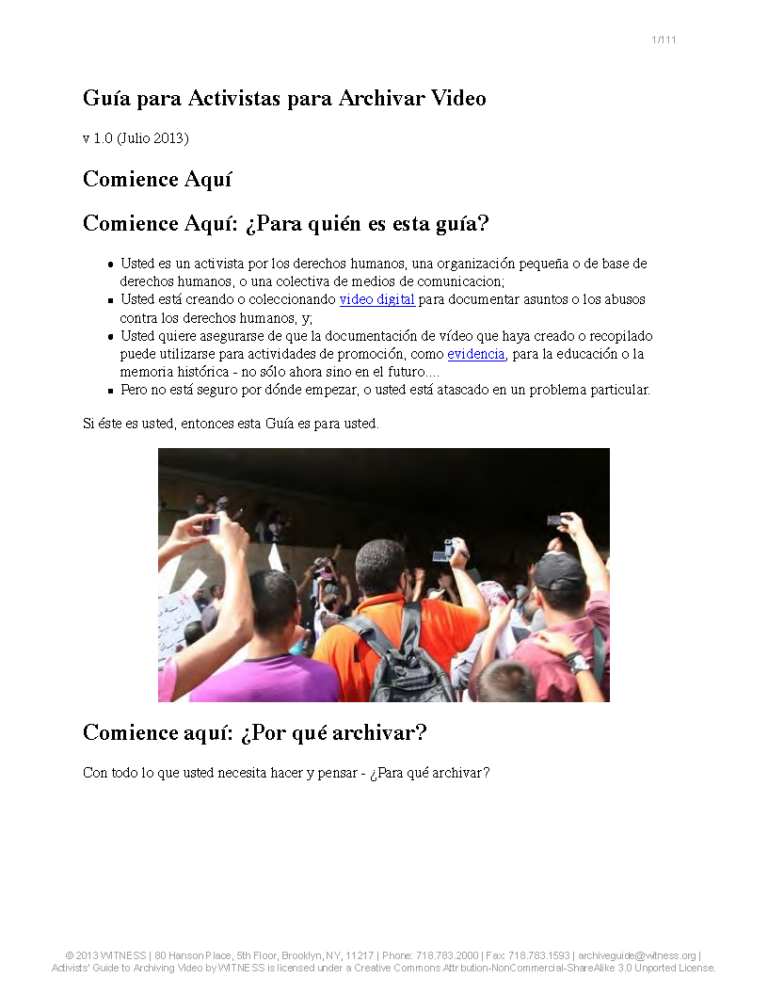
Guía para Activistas para Archivar Video
Esta es una versión en PDF de la Guía del activista para archivar videos, recursos elaborado por activistas de derechos humanos, ONG, colectivos de medios y activistas ciudadanos. La guía ofrece pasos prácticos para gestionar, almacenar, difundir y preservar videos.
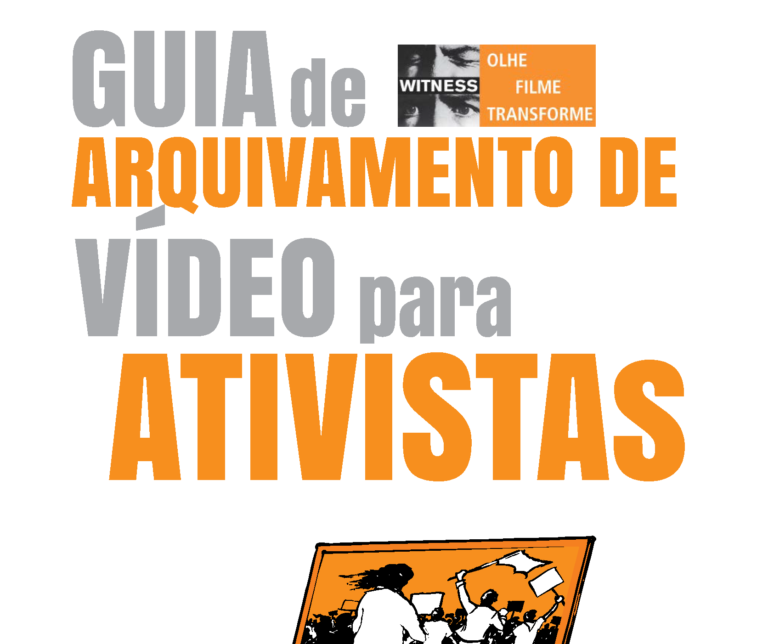
Guia de Arquivamento de Vídeo para Ativistas
Apresentando consistente base conceitual e ao mesmo tempo imediato caráter prático, o Guia pretende ser uma poderosa ferramenta para ativistas, estudantes e organizações ligadas a direitos humanos fazerem uso do vídeo como um instrumento de prova jurídica, bem como um documento de potencial importância histórica.

WITNESS, 2013
هذه نسخة بصيغة PDF لدليل الناشطين لأرشفة الفيديو، مصدر تم تطويره لكل من الناشطين والمنظمات غير الحكومية والمنظمات الإعلامية والنشطاء من المواطنين. يقدم هذا الدليل خطوات عملية لإدارة وتخزين ومشاركة وحفظ مقاطع الفيديو.
Sunsetted Tools
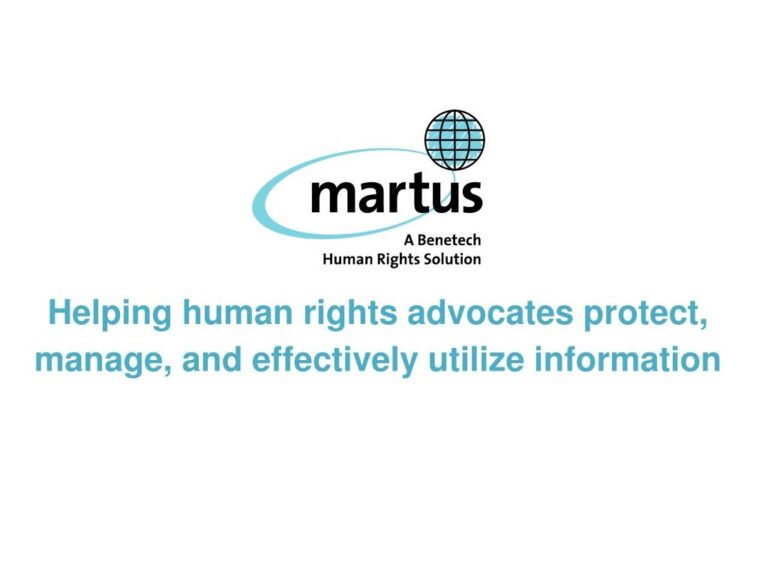
Information About Martus
Martus is a free, open-source, secure information collection and management tool that empowers human rights activists to be stronger in their fight against injustice and abuse.

Information about OpenEvSys
OpenEvsys, shorthand for Open Events System, is an open-source database application developed by HURIDOCS. This platform was developed on the Events Standard Formats for recording human rights violations and the “who did what to whom” data model.
Archival Standards and Protocols
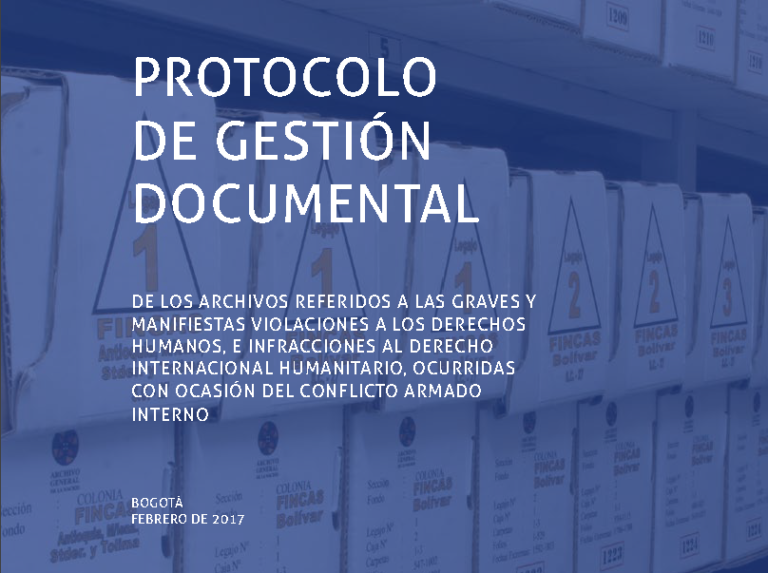
Protocolo de Gestión Documental
El “Protocolo de gestión documental de los archivos referidos a las graves y manifiestas violaciones a los Derechos Humanos, e infracciones al Derecho Internacional Humanitario, ocurridas con ocasión del conflicto armado interno” es un documento publicado por el CNMH y el Archivo General de la Nación (AGN), cumpliendo con las disposiciones de la Ley 1448 de 2011 o Ley de Víctimas y Restitución de Tierras, que establece los criterios y las medidas que se deben seguir para la identificación, protección, y garantías de acceso a la información de archivos de derechos humanos, memoria histórica y conflicto armado.
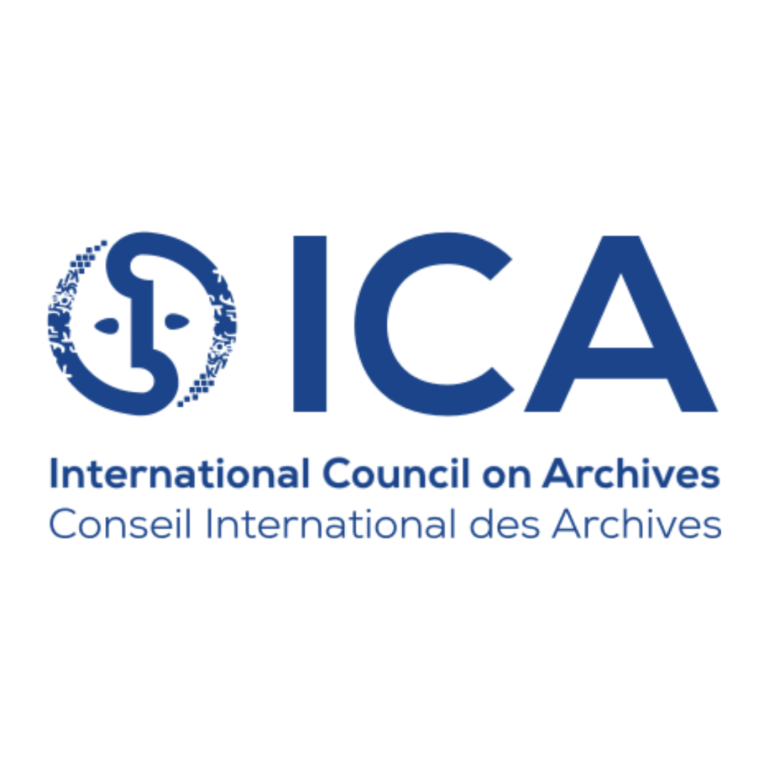
ISAD(G): General International Standard Archival Description - Second edition
This standard provides general guidance for the preparation of archival descriptions. It is to be used in conjunction with existing national standards or as the basis for the development of national standards. Available in 16 languages.

ISAAR (CPF): International Standard Archival Authority Record for Corporate Bodies, Persons and Families
This standard provides guidance for preparing archival authority records which provide descriptions of entities (corporate bodies, persons and families) associated with the creation and maintenance of archives. Available in 14 languages.

International Standards
This website provides access to a collection of international standards compiled by the International Council on Archives.
Regional Studies on Digital Archiving
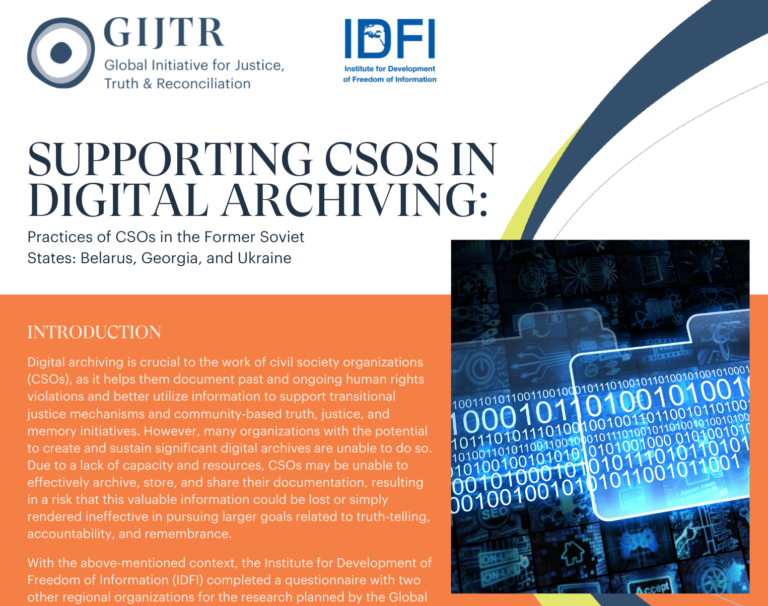
Supporting CSOs in Digital Archiving -- Practices of CSOs in the Former Soviet States: Belarus, Georgia, and Ukraine
Created with support from GIJTR, this report analyzes best practices and persistent challenges in digital archiving among CSOs in Belarus, Georgia and Ukraine. This resource is also available in Georgian. Please, see the next column.
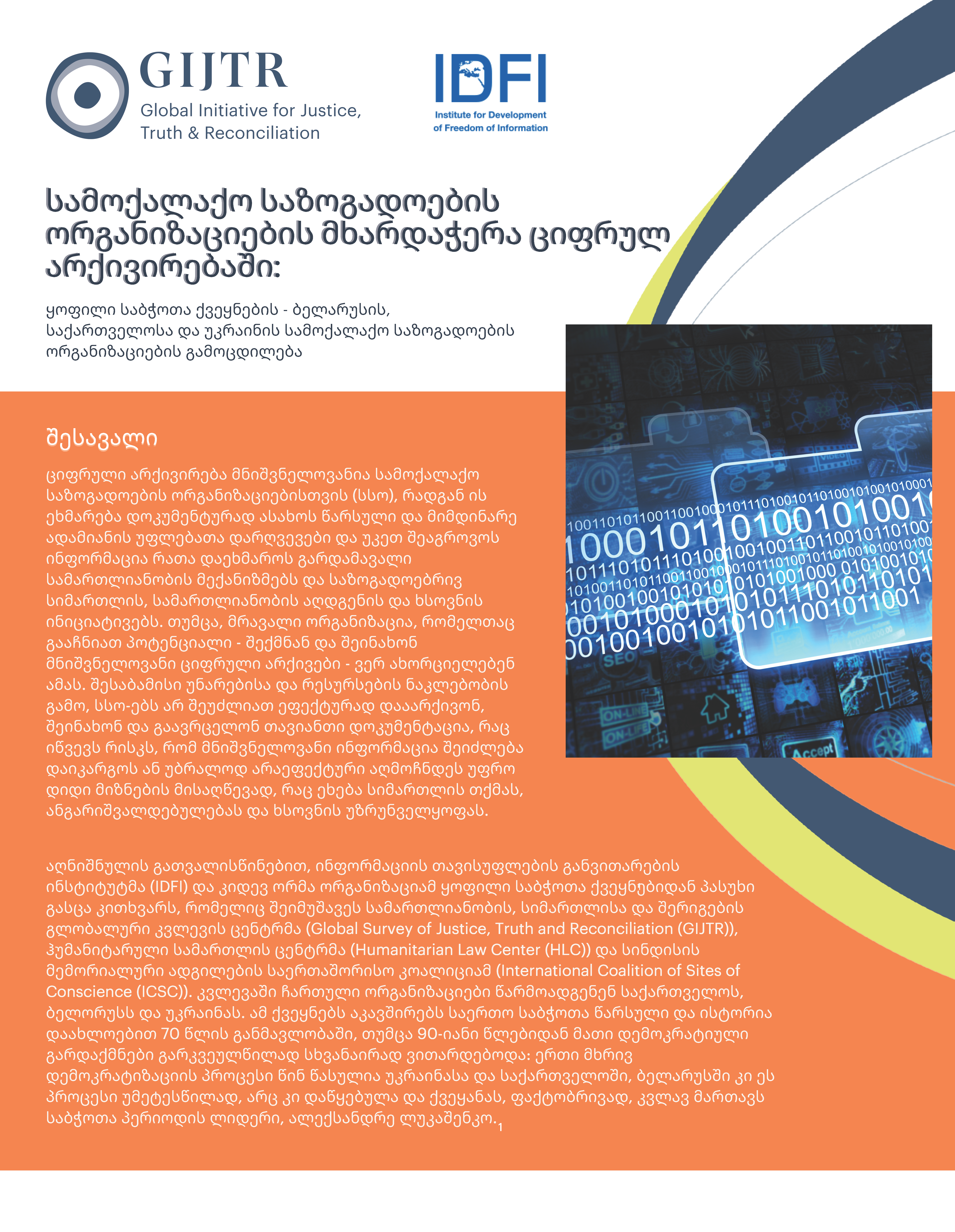
სამოქალაქო საზოგადოებისსამოქალაქო საზოგადოებისორგანიზაციების მხარდაჭერა ციფრულორგანიზაციების ციფრულ არქივირებაში
შექმნილია gijtr-ის მხარდაჭერით, ეს ანგარიში აანალიზებს საუკეთესო პრაქტიკას და მუდმივ გამოწვევებს ციფრულ არქივირებაში არასამთავრობო ორგანიზაციებს შორის ბელორუსში, საქართველოსა და უკრაინაში. ეს რესურსი ასევე ხელმისაწვდომია ქართულ ენაზე. გთხოვთ, იხ.
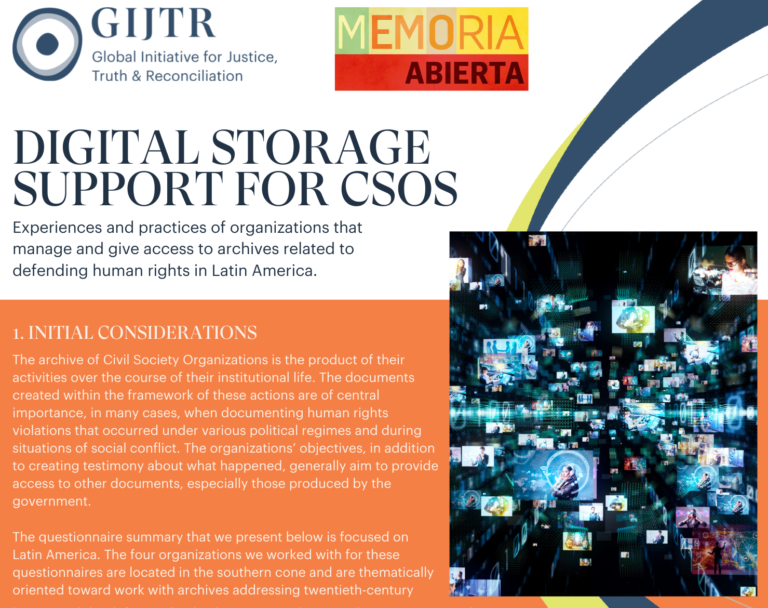
Digital Storage Support for CSOs
Created with support from GIJTR, this report analyzes best practices and persistent challenges in digital archiving for Latin American NGOs working to defend human rights. Also, available in Spanish (next resource).
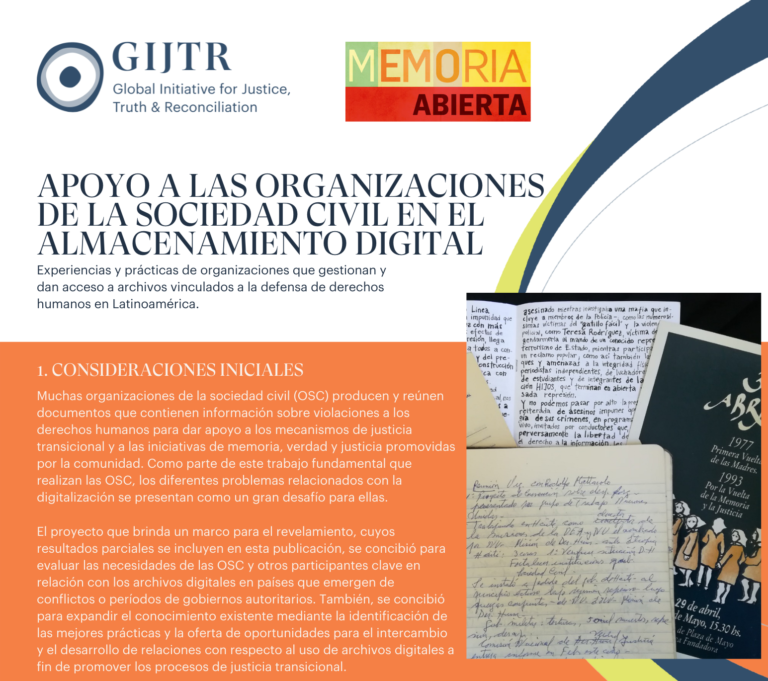
Apoyo a las Organizaciones de la Sociedad Civil en el Almacenamiento Digital
Creado con el apoyo de GIJTR, este informe analiza las mejores prácticas y los desafíos persistentes en el archivo digital para las ONG latinoamericanas que trabajan en defensa de los derechos humanos.
The Virtual Exchange will provide GIJTR project partners, CSOs and other key stakeholders with an occasion to share the preliminary findings of the research conducted in the first phase of the project and preview the themes to be addressed in future resources and knowledge products produced by GIJTR partners on digital archiving. To check the Spanish recordings of this virtual exchange, click here.


